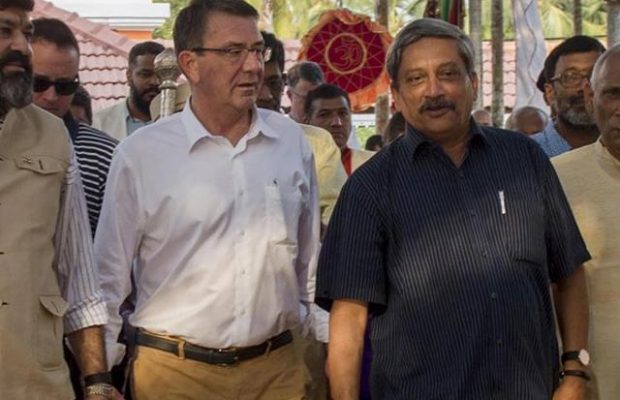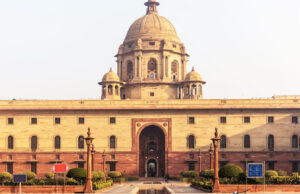LSA WITH THE USA IS NO CHILD’S PLAY

The United States of America has been a strategic partner to India for quite some time. But the haste with which the Narendra Modi-led government has gone after the Logistic Support Agreement (LSA) with the US raises serious concerns. When Defence Minister Manohar Parrikar and US Secretary of Defence Ashton Carter met in New Delhi last week and announced that they have reached an in-principle understanding to sign the LSA, defence experts were a little alarmed.
The agreement will provide logistical support and fuel supplies to the militaries of both countries from their respective bases. It was earlier proposed by the US in 2004. Talks had gone on during the UPA-led government’s tenure. But no final decision was ever taken. Despite Washington’s persuasions, there was resistance within the then government because it saw this agreement to be intrusive. It also felt that the signing of an LSA would be misconstrued by India’s other strategic partners if it is drawn into a military alliance with the USA.
The LSA-MOU signed by Modi government is one of the three Foundational Agreements. The second is CISMOA—the Communications and Information Security Memorandum of Agreement, followed by BECA—Basic Exchange and Cooperation Agreement. The Congress-led government between 2004 and 2014 had refused to sign any of these agreements, despite direct and indirect pressure from the US. Its refusal to sign CISMOA was because of the clauses, which would allow the US to take into its embrace the complete communication network of the Indian Armed Forces. The fear was that it would jeopardise India’s operational preparedness and strategies.
But now, the Modi government has said that they want to have LSA on a case-to-case basis. But the fact is that case-to-case basis formal arrangements already exist between India and its other strategic partners. When there is a specific requirement, these arrangements can provide the necessary facilitation. Why do we need to sign a formal LSA with the USA?
Having a clear mandate to form the government does not mean pushing India into a deeper military alliance with the US and in return becoming part of Washington’s larger operational design in the Asia-Pacific and South China Sea. It will undermine the critical geostrategic balance and also the balance of forces in India’s extended neighbourhood. Such an agreement would also be detrimental to our strategic and security interests. Any such agreement will also require the presence of US support personnel for maintenance and repair in India’s military bases. The Modi government’s decision to sign the LSA is bound to invite opposition from our other strategic partners.
India has had strategic partnerships with many countries across the globe. But it has always been wary of being drawn into any military alliance. India adopted an approach that a strategic partnership with any one of its partners cannot be at the cost or expense of the other. That is why it has been able to maintain a balance on the global strategic map. An agreement for defence framework with the US was signed in 2005. A maritime security agreement was also signed with the US in 2006. Prime Minister Modi and his colleagues must understand that defence cooperation with a strategic partner country is one thing. But completely leaning to a specific military block is something which is contrary to India’s basic philosophy of non-alignment.
Strategic experts have seriously questioned the timing of the in-principle approval of the LSA. They are incensed that even the intent to sign this formal agreement was expressed soon after the recent embarrassment in Washington. Despite India’s acceptance in the global nuclear mainstream for its impeccable credentials on nuclear non-proliferation, we have been put on par with Pakistan. Prime Minister Modi was present there when the US chose to equate India with Pakistan when it came to the nuclear arsenal and recognition. The US continues to supply lethal weaponry—F-16 Aircraft—and other equipment to Pakistan. Is there any doubt in Washington that Pakistan, and its armed forces, in particular, do not have any friendly intentions towards India and its people?
India is now the world’s seventh-largest economy. It is also the sixth largest spender on defence and owns the third largest armed forces and a small nuclear arsenal. The government must properly reflect on the way India develops its relationship with the US. Suffice to say, the US has scores of arrangements, known as Acquisition and Cross-Servicing Agreements (ACSA), with allies, non-allies, and international organisations. A typical ACSA defines the objective as “reciprocal provision of logistic support, supplies, and services to the military forces of one Party by the other Party in return for either cash payment or the reciprocal provision of logistic support, supplies, and services to the military forces of the other Party”. But when it comes to actual benefit realisation, it is obvious that balance heavily tilts in favour of USA. The Modi government must recognise the importance of India’s time-tested policy of having strategic tie-ups keeping in mind its interests globally and regionally. The people of India will never endorse the handing over of our military sovereignty to any military block. Therefore, a Declaration of Intent to sign the LSA with the USA needs to be very carefully taken ahead. The essence of strategy is choosing what not to do. In strategy, it is important to see distant things as if they were close and to take a distanced view of close things. Dealing with the US in strategic areas is no child’s play. Sooner we learn it, the better.









You must be logged in to post a comment Login